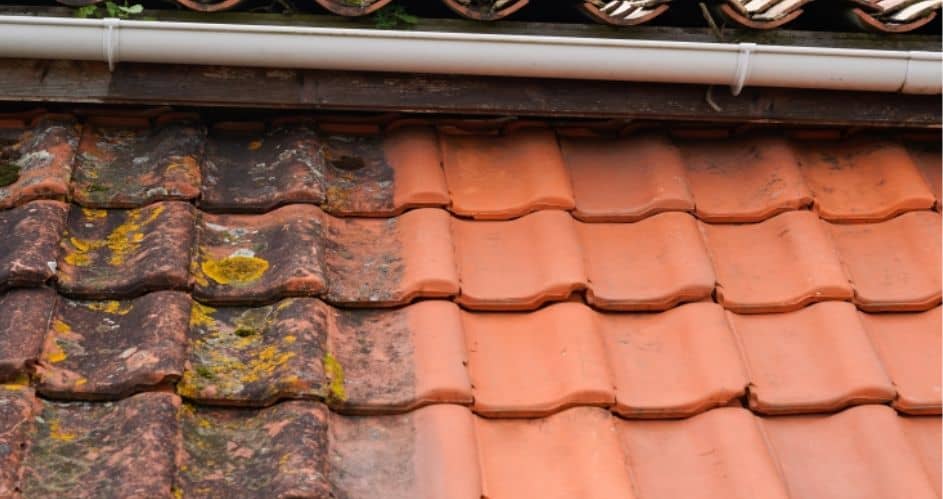
The roof is one of the most important parts of a house. With “top-down” engineering, roofs protect our homes from the elements. We must keep our roofs healthy, which means keeping them clean.
It makes sense then that as a responsible homeowner, you’d want to know how often you should clean your roof. Let’s examine how frequently homeowners should clean their roofs.
If you’re unsure how often you should clean your roof, contact Clear Vision Construction in Oregon. We’ve earned a reputation as a trusted roofing contractor through years of dedicated service and delivering quality results.
If you’re in the market for roof-related services, turn to us for solutions or guidance for your roofing needs.
Climate and Weather Permitting
Your ability to clean your roof is typically at the mercy of the elements. Harsh climates and weather make the already difficult task of roof cleaning more dangerous. Heat, snow, rain, and wind make going up on the roof dangerous. In areas with high humidity and heavy rainfall, vegetation can grow and thrive on your roof.
Roof Color
The color of your roof factors into how often it needs to be cleaned. Darker roofs attract more sunlight, fostering the growth of algae and mold. On the other hand, lighter-colored roofs tend to discourage organic growth and usually need less cleaning.
Consistent Monitoring
Inspections and cleaning go hand-in-hand for a healthy roof. Homeowners must be vigilant when inspecting their roofs, and inspections should be done at least twice yearly.
In cases of severe weather, roofs should be inspected once conditions are safe. It’s important to monitor for signs of damage, accumulating debris, and organic growth when conducting roof inspections.
Areas of Higher Risk
Some areas have a higher risk of build-up. For example, a home with a roof free of overhang may still be a congregating spot for birds. If not cleaned regularly, bird droppings can accumulate to cause water pooling and organic growth.
Another roof may accumulate soot from being in the path of fallout from a factory. Know what local risks may affect your roof.
Material Matters
Each roofing system demands different levels of attention. The roofing materials you choose will determine if they require minimal cleaning or more. It’s important to choose roofing materials that discourage organic growth.
Surrounding Vegetation
Depending on how close your roof is to trees will directly affect how often the roof must be cleaned. When branches, twigs, or other debris easily land on the roof, cleaning must be more frequent.
Organic Matter Maintenance
Whenever organic matter like moss or algae starts accumulating on your roof, it will need to be cleaned. Each seed that takes root on your roof presents a destructive force to the longevity of your roof.
That’s why it’s imperative to manage them decisively and early. Removing all organic matter before anything can lay roots, will prevent pooling water and help your roof.
Local Regulations and Recommendations
Some homeowners associations mandate regular cleaning and roof maintenance. Normally, these guidelines are crafted with the local climate and conditions in mind. The homeowners association may govern roof maintenance activity to protect property values in the neighborhood.
Keeping Critters Away
Any time you can hear animals scurrying about on your roof, that’s a cue to check your roof for damage. Rodents, cats, and birds can create nests and leave droppings that can damage your roof. Making sure that you clear debris and fix cracks and crevices can help discourage destructive animal activities on your roof.
Protective and Preventive Features
Experienced roofing contractors recommended investing in protective coatings and preventative features to reduce the need for excessive roof cleaning. These coatings and features are proven to be effective deterrents against congregating organic matter.
Protective coatings can be purchased online or directly from those who specialize in professional roofing services.
Roof Age
Another key factor in determining your roof cleaning frequency is the age of your roof. Newer roofs may have features that allow them to deter organic growth and weather-related damage.
Older roofs are less likely to have these qualities. It’s necessary to clean older roofs more often, and it’s a good idea to clean more frequently as the roof gets older.
Quarterly Cleanings and Monthly Maintenence
Seasonally cleaning your roof could prevent some of the most damaging factors that reduce the longevity of your roofing system. Homeowners who regularly clean and maintain their roofs often prevent expensive issues, keep their roofs pest and rodent-free, and extend the life of their roofs.
